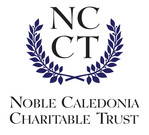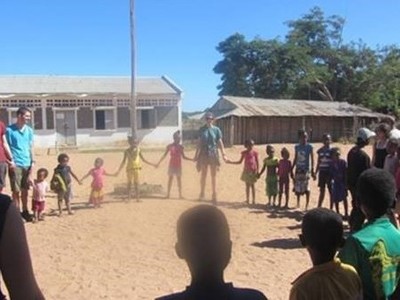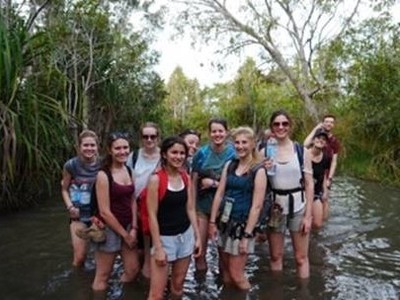 |
Madagascar Volunteering Expeditionby Sarah Mattey (Edgbarrow Secondary School, Crowthorne, Berks) |
Once presented with the opportunity of a lifetime to go with Operation Wallacea to spend two weeks in Madagascar, how could anyone say no? I raised £1700 by bag packing, babysitting, lifeguarding, tutoring maths and through cake sales and together with a generous grant from Noble Caledonia I had the funds to join the expedition. The expedition involved both spending a week in the forest across two camps, Mariarano and Matsedroy, followed by a week in the Maradoka camp on the island Nosy Be. In both locations I was able to see the vibrant wildlife and amazing scenery the country is known for.

During my time in the forest camps, I was able to see first-hand the research that the scientists had been conducting throughout the season. I accompanied them on surveys both in the day and at night and helped to gather research by spotting lemurs, labelling birds and catching butterflies. Particularly, the night surveys were the most enjoyable, despite the lack of day light, because we saw the most! With a head torch it became a lot easier to spot lemurs, spiders, chameleons, snakes, scorpions and much more due to the reflection on their eyes. Because they were easier to spot I had the opportunity to hold many snakes and chameleons. However, the day time surveys were by no means dull as it was during the day I accompanied scientists on a hog nose survey, a snake only found in this particular area on forest, mist netting for birds which I was then able to both handle and label. While I participated in a lot of actual research, we had daily lectures lead by the scientists on the local ecology and conservation issues relevant to the work we were doing.

Currently this area in the Mahavamo Forest has no formal protection. The data collected by the scientists on carbon and patterns and trends in biodiversity data will provide the information needed to produce an application establishing the forests as a community managed protected area for sustainable use.
Once my time in the dry forests was up, I travelled to Nosy Be, an island north of Madagascar to both complete my PADI open water diver qualification and to help with the annual surveys of the reef fish and coral communities to assess the effectiveness of the national park in protecting the reefs. The research here involved diving to depths of up to 12 metres with quadrats and then counting the species in the specific area. Alternatively taking down a colour reference card which is used to measure the amount of coral bleaching on the reef, which is caused by stress to the coral.
From this opportunity of a lifetime, I not only gained my diving qualification but also a new appreciation of both the wildlife on the world’s 4th largest island and the conservation work that scientists are contributing to. I saw many animals, plants and environments the island is famous for and that only a small number of people will ever get to experience. Aside from the helping the scientists in the field and learning more about the project, being able to witness the lives of the local Malagasy people is something that I enjoyed the most. From visiting a local primary school in the Mariarano village to driving through extremely remote parts of the island, everyone noticed the sense of community amongst the people. Overall this trip was a wonderful experience and one that I would happily take part in again!





